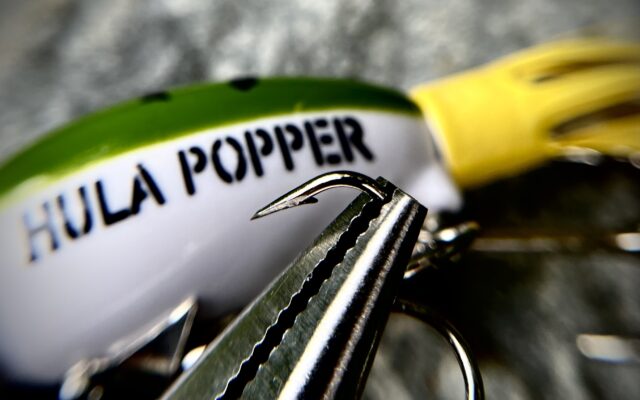
I learned a painful fishing lesson after stabbing a hook in my thumb
By Chris Sargent
It was bound to happen, and, to be honest, I was well past due. No amount of careful consideration, caution or preparedness can prevent the inevitable from happening to any serious fisherman.
Through the years, I’d had my fair share of close calls — and thanked my lucky stars on many occasions — but there was no escaping it this time.
Sure enough, there I stood in waist-deep water holding a scrappy 14-inch largemouth that put up one heck of a fight after smashing a Hula Popper near the edge of some lily pads. The only problem was, that bass wasn’t the only thing I’d caught. Moments earlier, just as I reached down to lift the fish out of the water by its bottom lip, a violent head shake sailed a needle-sharp treble hook solidly into the pad of my right thumb, well beyond the barb.
Now what?
There’s a lot that goes through one’s mind when this happens. Given my newfound status as a veteran of such happenstance and member of an elite but not so exclusive club, I now feel qualified to counsel those who haven’t been so unlucky.
For starters, there’s the scream.
It will be loud, involuntary and likely animalistic. At 38 years old, I felt as though I had a firm grasp and understanding of my vocal range, but I’ve not yet been able to repeat the deep, guttural utterance that escaped my lips at that moment.
Closely following the scream from the initial piercing comes an excruciating blast of pain. I’ve not given birth and don’t expect I ever will, but I can’t help but think this must rank at least somewhere in the rough neighborhood.
Once you’ve checked off a scream and the acceptance of blinding pain, it’s time for the third stage of this unfortunate circus. There will be a moment or two in time where everything stops. Things get quiet, solemn and anxious. By my calculations, I experienced what I figure was three to five seconds of complete astonishment where there were no thoughts other than bewilderment and awe regarding my plight. It’s best not to linger too long in this stage.
I offer this nugget of sage advice after doing so myself, which allowed the fish time for a second headshake, restarting the whole process all over again. Once you’ve successfully completed stage three, the fourth kicks in and your mind begins to race with ideas of how you might get yourself out of the predicament.
When faced with dangerous, threatening or hazardous situations, often our next moves and decisions are guided by an involuntary physiological stress response, commonly referred to as fight, flight or freeze. I navigated stage four by utilizing a healthy dose of flight.
After securing the rod under my arm, I grabbed the bass with my left hand and very efficiently made it the 20 feet to shore. Once there, I dropped to my knees and began to scan my brain for a solution while the bass continued to struggle, moving the point of the hook back and forth, deeper into my thumb.
After a few deep breaths, I entered stage five with a clearer mind and hasty, but well-thought-out plan. Ever so gently, I maneuvered the fish to the ground and very carefully pinned it there with my right knee, freeing my left hand. A few years ago, I began faithfully carrying a Leatherman multitool with me every time I fished, no matter what — a practice I was exceptionally thankful for in that moment.
However, the Leatherman was securely clipped to my belt just beyond the right pocket of my pants, and I was unable to reach it with my free hand due to my delicate pose. Slowly, I slid my right arm down and carefully worked the Leatherman upward until it became free and fell to the ground. After a quick one-handed deployment of the multitool, it was now or never.
“Don’t think about it. Just do it,” I repeated to myself a couple of times while gripping the pliers tightly near the bottom bend of the hook. Then with my right hand and thumb braced against my leg, I swiftly fired the pliers upward and straight away from the direction of the hook’s point with tremendous purpose. An audible “tick” resulted as the barb tore through the meat and skin of my thumb but it was a success.
I was free.
Blood dripped from my hand as I unhooked the bass and tossed it back into the water. I stood for a few moments, took a couple deep breaths and wondered what my next move should be. I thought about calling it a day and heading for home but there were still a good 20 minutes of daylight left and the fish were biting, so the decision was easy. I grabbed my rod, clipped the Leatherman onto my belt and went back to casting.
Sometimes you just have to pay to play.